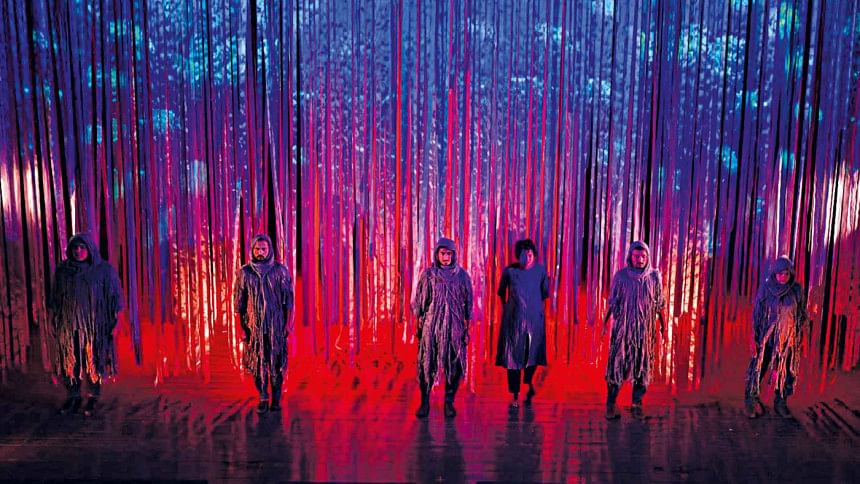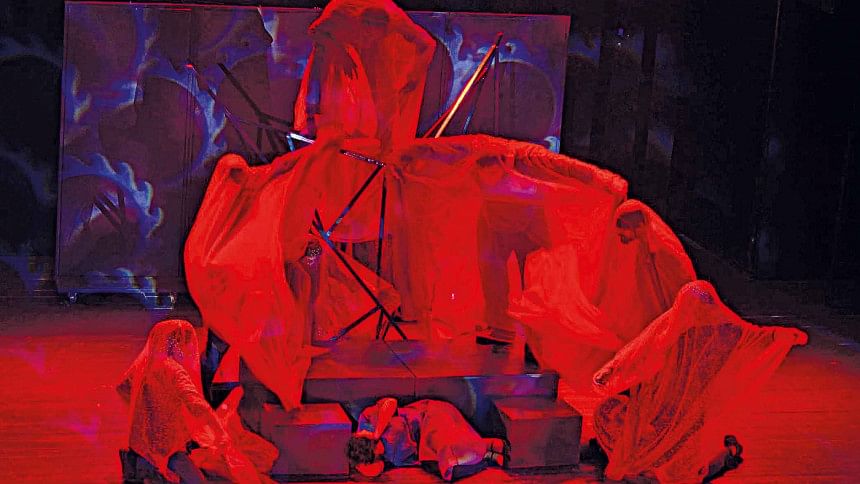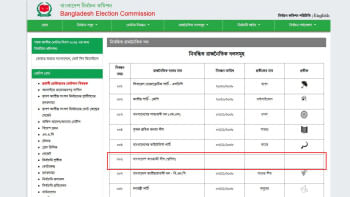4.48 Montrash

Syed Jamil Ahmed
Professional theatre began in Dhaka around the 80s, but when movies started getting popular, people stopped coming to theatres. This impacted the theatre industry, and soon, theatre companies were not earning enough to give proper amounts of money to their actors. So, these companies started to rely on people that volunteered to act. However, with people having to face more needs of earning more, less people are volunteering for theatre. The ones who used to act in theatre are facing other commitments, while the newcomers are deciding to pursue other careers which provide better pay. In the last three plays I did, I did not take any pay for directing it, and on some plays, Mohsina or Rana did not even take pay for their roles as the dramatiser and assistant director. But, for the actors, we still provided them with as much as we could when it came to a fee. This was also the case for 4.48 Montrash. For that play, we actually started rehearsing last March, but we did not get much time to practise in person. Due to the COVID-19 pandemic, we had to switch to practising online, and we would practise our speech and the play analysis. Afterwards, around September, we started doing workshops, and even though some people in our troop had to leave, we had people to take their places. During the end of September, we returned to Dhaka, but upon returning, we found out that there were not any rehearsal space which was open. But, we were granted permission to rehearse at the Dhaka University Bot Tola, and I, once again, have to thank the Dean of the Art Faculty for letting us rehearse there. Now, about professional theatre, we want to do it in this country, but it is not possible to do it with people who are volunteering out of their love for theatre. We need professional actors who will devote their whole time into this. I think that at one point, it will be possible to do professional theatre here, but even then, it might not generate a large amount of revenue. Furthermore, to do professional plays, we require plays of very high calibre. And to do that, it is my duty as a play director to properly be able to use the actors in a way which will resonate with the audiences. It is very challenging, and the assistant director helped me a lot with that. Mohsina also helped me a lot, and she even helped me fix a few scenes because they were not perfect yet. I am very grateful to my actors as well as they never gave up. Without their support, I could not have been able to come this far. I must also add that in other countries, most theatre companies are state sponsored. The governments back the theatre companies, and if the companies face a loss, they are supported by the government. So, the companies do not just have to do plays which will sell more tickets, but they can do plays which they feel are important. Even in countries where the state does not give financial support to theatre, there are many other ways to get funding. If we can try, I believe that it will be possible to have professional theatre companies in this country.

Shahman Moishan
Thank you for having me here today. I am really glad that I am getting to start my day alongside so many of my friends discussing such an interesting topic. Coincidentally, I'm currently in the country where Sarah Kane was born and died, which, to me, feels like destiny's plan and is also a great honour. I got involved with this project during a time when I was looking to interview Aly Zaker. One evening, I was chatting with Mohsina and Rana inside Dhaka University, and that is when we first discussed the play. Sarah Kane had attempted suicide in February of 1999, after which she stayed in King's College Hospital in London for three days. After that incident, she began waking up at 4:48 every morning to start writing, which is when she wrote 4.48 Psychosis. The play is often regarded as somewhat of an autobiography by many critics. She also became a worldwide icon after writing it. In Bangladesh, too, the play was performed twice due to its popularity and uniqueness: the first was in the Dhaka University theatre department by students, and the second time was by Jamil sir through Spardha. Many considered it to be a suicide note which, in a way, completed her performance art. If you have the opportunity to read or watch the play, you will see that it has completely shifted away from the traditional elements of European plays, almost like a rebellion of Sarah Kane. It has broken all rules and rejected or refused the pre-conceived ideas we have of a general plot and characters from a play. Some have characterised the play under the genre of post dramatic theatre, much like Chekhov or Harold Pinter's works. However, even the works of the latter have a linear development, unlike the unstructured form of this play. With the knowledge of psycho pharmaceutical drugs assigned to certain mental disorders, critics have also pointed out how Sarah Kane has portrayed and connected the stages of depression to psychosis to suicide in her play. I was first introduced to Sarah Kane's work in 2009 whereupon I found that her thoughts and ideas aligned with mine in many ways. She became one of my favourite playwrights. So, when I heard about Spardha, I almost hastily wanted to become a part of it. However, while it is quite easy to translate data and facts, fiction is not the same. Whenever we attempt to translate a poem or play from another language, it most often becomes an adaptation of the original work. This is something I was worried about, as I wanted the intensity of emotions and the genius of the play to show through, even when performed in Bangla. That is why I decided to first try and translate quite spontaneously to translate not with my knowledge of the Bangla language, but in an organic way which encompassed what I wanted. I hoped to trans-create it, not just literally and linguistically translate it. I wanted to present it in a way that would help us tell the story that connects to our present time and place. I was more of a newcomer in the team, so I don't know much of the details of the production process and the shows themselves. However, even though I am thousands of miles away from the action, I could sense the team's and the play's success.

Md. Sohel Rana
Thank you Rafi bhai and The Daily Star for having me here today. It was truly an honour for me to work alongside Jamil sir as an assistant instructor. I was in charge of maintaining the production process and the Spardha crew as well. My work definitely has difficult moments, but working alongside Jamil sir makes it much easier. He is very meticulous and is quick to point out any mistakes that are made. We have tried our best to carry the production out in the best way possible, and in a respectful manner as well, even when it came to remuneration which is quite an issue in theatre. Everyone on our team was paid a fee based on the number of shows, rather than a daily remuneration. The actors were all paid equally, but those on the technical team and such were paid according to their contribution. We began our work on December, and I breathed a sigh of relief after the last show for having successfully carried out our project. I'm really glad that our pre-planned budget and ideas all worked out well, even though we had to work with certain risks, especially with Jamil sir. It is great to see that he is well again. It was definitely a difficult environment to work in due to the pandemic. I hope we all stay well and that we can go even far with our play.

 For all latest news, follow The Daily Star's Google News channel.
For all latest news, follow The Daily Star's Google News channel. 



Comments